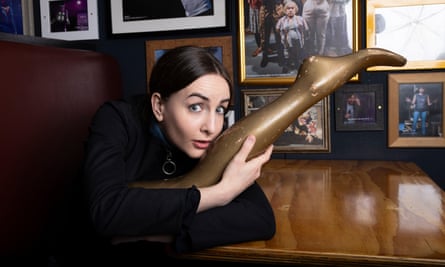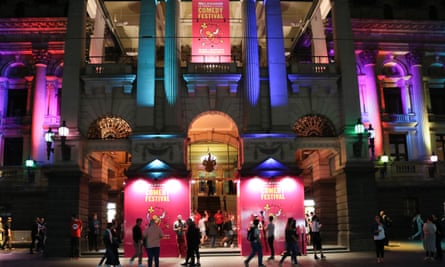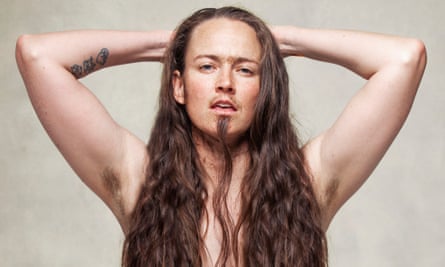What’s the biggest comedy festival in the world? Parochial Britons would say Edinburgh. Internationalists may consider Montreal’s Just for Laughs. They would all be wrong. Just for Laughs is out of the running: it filed for bankruptcy protection earlier this year, its future in doubt. And the Edinburgh fringe is a performing arts festival not just comedy. So for now, if only on that technicality, Melbourne has the biggest comedy festival in the world: a three-week carnival of standup, sketch and beyond, dedicated to nothing but the art of making people laugh.
In 20-plus years writing about comedy, I had never been – until now. But I have felt its influence. Twice recently, the winner of its most outstanding show award went on to win the Edinburgh equivalent. One was Hannah Gadsby’s Nanette, arguably the most significant standup set of the last decade, which launched in Melbourne before conquering the world. And as recently as 2022, a former Melbourne champ – recent Taskmaster star Sam Campbell – won Edinburgh’s top prize, of which Australia has now provided more winners than any other non-UK country. The festival also played a weathervane role in the “trans debate”, when its main award – for years known as the Barry, after Barry Humphries – was re-named after the Dame Edna star’s divisive comments about transgender people.
But if Melbourne looks, to British eyes, like a staging post in the run-up to Edinburgh, it doesn’t feel like that on the ground. Yes, there are shows that will come to Scotland in a few months’ time, the keenly anticipated newbie from Rose (Starstruck) Matafeo among them. Gadsby’s Woof!, which I watched on my first night here as my jetlagged eyelids drooped irresistibly, is soon to tour the UK. Even through my exhaustion, it was exciting to see Gadsby on home turf, delivering a looser, more playful set than we expect, taking in Cabbage Patch Kids, abortion, the Barbie movie and whale watching. Unusually in a festival context, she also shared her audience with a different support act nightly – Oliver Coleman, when I was there, whose own set Goof was this week nominated for most outstanding show.
Coleman looks like a star in the making: Goof showcases an act with a pop-eyed intensity and grandiose turn of phrase, pondering the big questions (“Am I unknowable even to myself?!”) and the small ones (papaya versus mango) with equal, full-body commitment. He’s one to look out for on the fringe in August – as is Piotr Sikora’s character act Furiozo. Sikora’s silent comedy act is an lesson in not judging by appearances. Bare-chested, bullet-headed Furiozo comes across like a clenched fist in human form. The delightful surprise is that, as he depicts his life of delinquency and ultra-violence, Sikora is the gentlest clown, ringleading his participatory hour with a lovely light touch.

Furiozo didn’t make the shortlist for the festival’s main award, which included several shows familiar to UK audiences: John Kearns’ terrific The Varnishing Days alongside Sarah Keyworth’s latest and Julia Masli’s smash agony aunt hour ha ha ha ha ha ha ha. Also among the nominees is Indian standup Kanan Gill, with a slick hour of existential meditation, which tours the UK in May. Kiwi up-and-comer Ray O’Leary featured, with a set full of zingers delivered in an accent made for deadpan. Homegrown contenders included Lou Wall’s The Bisexual’s Lament, a PowerPoint-driven ride through the comic’s traumatic 2023, and Celia Pacquola’s first show since 2018, I’m As Surprised As You Are. The winner is announced on Saturday.
Few of these acts see Melbourne as any kind of appetiser for Edinburgh. This is a festival with a confident sense of itself. It’s Australia’s biggest ticketed event, too, selling around 770,000 seats each year. Its opening gala, televised on the public TV network ABC, is “the biggest night on Australia’s comedy calendar”. Many of the 30-odd acts I see vocalise their gratitude and pride that the festival takes place in their city/country/hemisphere.
Their shows are clearly made with a domestic audience in mind: over and over, I’m confronted with Aussie references whose significance I have to guess at, from Peter Dutton (very rightwing leader of the Australian opposition) to Schmackos (a dog food, apparently); from Bunnings (a hardware store) to Have You Been Paying Attention? (a panel show local comedians want to appear on). I find myself filled with renewed respect for those Aussie (and other international) acts who do make it to the UK and tailor their shows accordingly: it’s easy to forget how culturally specific standup usually is.

That’s part of the fun for the visitor. On more than one occasion, I encountered acts with big local followings and a palpable buzz around them, of whose oeuvre this comedy critic had been, until now, blissfully ignorant. The easygoing New Zealander Guy Montgomery, say, whose following has sky-rocketed since his own appearance on Taskmaster NZ, and who co-hosted the festival’s gala night this year – or the antic Gen Z double-act Mel & Sam, whose drolly titled show The Platonic Human Centipede celebrated (and sent up) queerness, polyamory and Willy Wonka in a succession of outre musical set-pieces.
I would have happily seen more of the same – but Melbourne’s event isn’t as 24/7 as Edinburgh’s. In the UK, the whole city is overtaken by performance, around the clock. Down under, shows are mainly in the evening, in dozens of venues, the most prominent of which is the Town Hall, whose old-school Assembly Rooms vibe feels familiar to veteran fringe hands like me. There’s a curated element to the festival, in that the international acts, Britons among them, are here mainly by invitation.
One of them, Paul Currie, had his show pulled – by his venue, not by the festival – after the controversy over his treatment of an Israeli audience member at Soho theatre in London in February. There are far fewer American and European acts than in Edinburgh, and more from east and south-east Asia – as you’d expect, if you looked at a map or tuned in to current conversations about Australia embracing its Asian identity.
Some would prefer, mind you, that it cling to its white European heritage instead. Last year, in what many see as the country’s Brexit moment, Australians rejected in a referendum proposals for an increased voice for Indigenous people in the nation’s governance. The vote split the country, if not down the middle, then 60/40. Its after-effects are keenly felt at the comedy festival, in the rote announcement that precedes each performance (“This always was and always will be Aboriginal land”), and in shows like Good Point Well Made by comic Tom Ballard, which rages against Aussie racism and the timidity of the victorious slogan: “If you don’t know, vote No.” It’s a smart set, that asks searching questions about the country’s identity post-plebiscite while savouring the gallows humour of perpetual leftwing defeat. What to do now with all that redundant “Yes” merch?

There are plenty First Nation comics at Melbourne, of course, on the Aboriginal Comedy Allstars bill and in individual shows by the likes of Dane Simpson, Jay Wymarra, Dave Woodhead and Sean Choolburra. Woodhead has a bad gig when I attend, arguing with taciturn punters in the front row, and cracking the kind of mildly sexist jokes that Zoë Coombs Marr satirised in her cross-dressing character act Dave. (As Woodhead himself jokes, male Australian comics have to be called Dave.) Coombs Marr, a big star of Aussie comedy, has more to offer elsewhere in town, with a big-hitting show (also Edinburgh-bound) inviting her audience to navigate through Every Single Thing in My Whole Entire Life.
That race and culture remain contentious issues in Australian life is obvious from show titles such as Chinese Australian (by TikTok star Jenny Tian) and Takashi Wakasugi’s award-nominated Japanese Aussie, both of which imply that the very idea of Asian-Australian identity remains noteworthy. The satirist Nazeem Hussain could hardly be more explicit in his show Totally Normal about “bogan racism” and his own experience of prejudice after moving to the high-end Melbourne suburb of Hawthorn East. He’s confrontational on British colonialism and Israel/Palestine, too, in a pleasingly prickly set at Melbourne Town Hall.
At the nearby Arts Centre, the acrobatic troupe Circus Oz even get in on the act, with an iconoclastic show deconstructing statues of Captain Cook and others. Comedy can’t reverse the referendum result, or resolve Australia’s particular issues with race and identity – but a festival as diverse, polyphonic and exciting as this, and the laughter it provides, can rally the spirits a little, absolve some of the pain, and start paving the way to a more open-hearted future.
It certainly rallied my spirits. It’s been a thrill to be here. I warmly recommend Melbourne’s comedy festival – whether it’s the world’s biggest or not – to all lovers of comedy.
